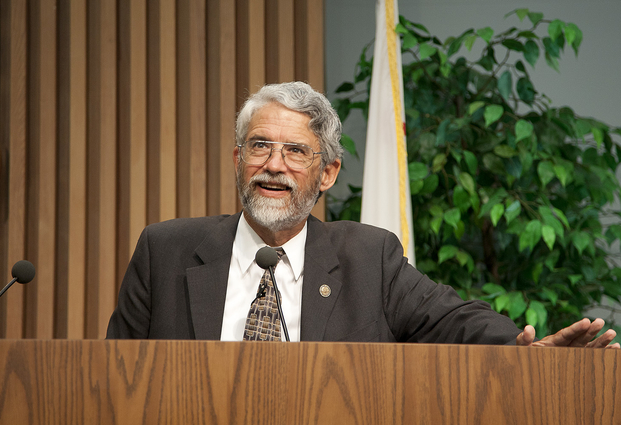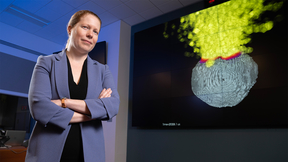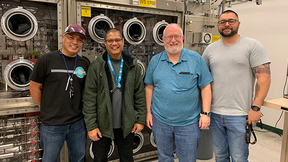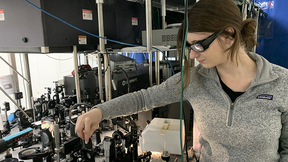A conversation with the president's science adviser
Holdren is the assistant to the president on Science and Technology, director of the White House Office of Science and Technology Policy (OSTP), and co-chair of the President's Council of Advisers on Science and Technology (PCAST). He has long-standing ties to LLNL, working as a physicist in the Magnetic Fusion Energy program in the early 1970s and a consultant to the Laboratory until 1994, when he entered government service in the Clinton administration.
"Having been at the Lab, I do know first-hand how difficult and challenging the problems are that you work on every day," Holdren said. "The nation owes this Lab and the other national security labs a debt of gratitude."
He emphasized that the president fully recognizes the need for science and technology and has appointed numerous eminent scientists and engineers, including Nobel laureates and National Academy of Science members, to key positions in his administration. "He meets with them regularly and listens to them."
Holdren noted that the president also has a strong interest in the S&T pipeline and Science, Technology, Engineering and Math (STEM) education. "He knows that today's students are tomorrow's scientists and engineers. They're the ones who will tackle the problems that you [the current generation of scientists and engineers] haven't solved."
He acknowledged that the overall budget environment is very difficult, "We're working to alleviate those issues that can be done by executive authority, but others take Congressional action."
According to Holdren, S&T has fared better than any other domain in recent presidential budget requests. He asserted that the administration is determined not to sacrifice S&T necessary for national security and future economic prosperity for short-term deficit reduction. "It makes no sense to eat our seed corn."
Public-private partnerships are crucial to success in a wide range of endeavors and thus are an important component of the president's S&T strategy. "These problems are too big to be solved by one or the other."
One such example is Obama's "Educate to Innovate" campaign, aimed at improving STEM education. The initiative includes efforts by the federal government, leading companies, foundations, non-profits and science and engineering societies to improve U.S. students' participation and performance in science, technology, engineering and mathematics. Holdren noted that since it was launched in late 2009, more than three-quarters of a billion dollars in contributions have been raised for the campaign.
"I know that Livermore and Sandia have a long history of involvement in STEM outreach," Holdren said. "I can't think of more inspiring role models for students than the scientists and engineers here."
Holdren highlighted space exploration as another example of public-private collaboration. The success of SpaceX's Dragon spacecraft in carrying cargo to the International Space Station shows the potential of such collaboration. "The extent of partnerships in the space domain is only going to grow in the future."
According to Holdren, now that moving astronauts and supplies to and from the space station is "relatively straightforward," turning over this task to the private sector makes sense. It should lead to increased efficiencies and allow NASA to turn its attention to missions like the Mars rover Curiosity .
He drew parallels between Curiosity and the National Ignition Facility, noting that both are enormously complicated and sophisticated technologies coming together into working systems that do things that have never been done before. "These are the risky but groundbreaking enterprises that the federal government will always have to invest in."
Holdren also cited the recently announced Big Data Research and Development Initiative and the presidential memorandum on accelerating technology transfer and commercialization of federally funded R&D as further examples of the administration's efforts in supporting science and technology to advance national security and economic prosperity.
Turning to matters of policy, Holdren said that the administration is looking closely at the issue of lab governance, with the aim of smoothing out difficulties and minimizing micromanagement. "Governance should make things as easy as possible for the people at the labs to get their important job done....While we're far away geographically, we're not far away in spirit as to what needs to get done."
He closed his prepared remarks with a nod to LLNL's upcoming 60th anniversary. "This Laboratory has come a long way, and it's absolutely essential that this excellence continue."
Holdren then fielded questions from employees. Asked about the impact of U.S. support for ITER on the domestic fusion energy program, he noted the difficulty and necessity of balancing the nation's commitment to both programs. He observed that in a budget environment where most programs are being cut, "flat is the new 'up.'"
Other questions dealt with Holdren's view of privatizing Lab management contracts ("I don't have a strong view at this point but I'm willing to take input"), the international debate on mitigating carbon emissions vs. adapting to climate change ("we have to do both; we have to manage the unavoidable and avoid the unmanageable"), and the need to engage industry to gain consensus and support in the development of fusion energy technologies ("it's very important to engage industry but I wouldn't hold my breath for early consensus").
When asked why high-risk, long-term projects like the Mars rover Curiosity garner both public and Congressional support but other, perhaps more important projects don't, Holdren opined that "space exploration is in our bones; space excites people, exploration excites people." As a result, it's easier to gain support for space missions and research. However, it's not easy to get funding in the current budget climate. "We won't see another mission as complex and expensive as Curiosity for a long time."
Returning to the issue of energy, Holdren said that somehow we need to make the energy challenge exciting. "It's one of the most important issues of our time-how can we get the energy needed to ensure prosperity without destroying the climate? We have to find a way to make this compelling and inspiring."








